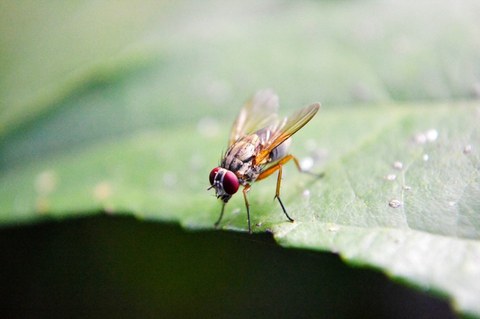Jun 30, 2023
Running on Fumes? Fruit Flies Stay Sharp by Flipping a Metabolic Switch in the Brain
A new study led by scientists from TUD Dresden University of Technology reveals that the cells in the fruit fly brain possess a remarkable ability to shift their energy production to fats and send signals to the body's other organs, prompting them to start delivering lipids from fat stores to the brain during periods of starvation. The findings were published in the journal Nature Communications.
The brain, being one of the body's most energy-demanding organs, typically relies on sugar as its primary fuel source. However, during starvation, the brain can adapt and utilize alternative fuels, such as ketone bodies derived from stored fat. The question of whether brain cells can solely rely on externally obtained fuel or directly utilize fat has long puzzled scientists.
Metabolic Switch
Led by Prof. Stefanie Schirmeier from the Faculty of Biology and Dr. Marko Brankatschk from the Biotechnology Center (BIOTEC) at TU Dresden, the research team used a comprehensive range of methods, including genetic manipulation, molecular biology, lipid analysis, and behavioral studies, to demonstrate how fruit fly brain cells can switch to fats to generate alternative neuronal fuel and safeguard against neurodegeneration.
"While neurons often come to mind when we think of the brain, there are other cells in the brain, called glia. They play vital roles in supporting and maintaining neurons. Our study shows that these glial cells respond to sugar shortage by activating fat utilization. In fruit flies, these cells utilize fats stored in lipid droplets or absorb lipids from circulation to produce ketones for the neurons to consume. This switch is crucial for the fly's survival," explains Dr. Marko Brankatschk, research group leader at BIOTEC.
Metabolic Sensor
The study also revealed that glial cells act as messengers, signaling the body about the brain's energy shortage. "Our findings suggest that the metabolic switch in glial cells acts as a trigger, initiating a communication cascade that alerts the rest of the body to the challenging metabolic situation in the brain. As a result, the body's fat-storing organs mobilize reserves to sustain the brain's energy supply. It remains to be seen if a similar mechanism exists in the human brain," explains Prof. Schirmeier.
"Our work relies on Drosophila melanogaster, the common fruit fly, which has long served as a valuable model organism for studying development and disease. Our study demonstrates its potential to unlock insights into complex metabolic changes and their biological consequences," concludes Prof. Schirmeier.
The research conducted by TU Dresden scientists holds the potential to expand our understanding of brain metabolism and highlights the significance of studying simple model organisms to discover the intricate mechanisms underlying complex biological processes.
Original Publication
Ellen McMullen, Helen Hertenstein, Katrin Strassburger, Leon Deharde, Marko Brankatschk, Stefanie Schirmeier: Glycolytically impaired Drosophila glial cells fuel neural metabolism via b-oxidation. Nature Communications (May 2023)
Link: https://rdcu.be/dcTMN
About the Biotechnology Center (BIOTEC)
The Biotechnology Center (BIOTEC) was founded in 2000 as a central scientific unit of the TU Dresden with the goal of combining modern approaches in molecular and cell biology with the traditionally strong engineering in Dresden. Since 2016, the BIOTEC is part of the central scientific unit “Center for Molecular and Cellular Bioengineering” (CMCB) of the TU Dresden. The BIOTEC is fostering developments in research and teaching within the Molecular Bioengineering research field and combines approaches in cell biology, biophysics and bioinformatics. It plays a central role within the research priority area Health Sciences, Biomedicine and Bioengineering of the TU Dresden.
www.tud.de/biotec
www.tud.de/cmcb
About the Faculty of Biology
With its reestablishment in 1994, the Faculty of Biology at the TUD Dresden University of Technology (TU Dresden) has developed as the nucleus of Dresden's life sciences, which today include many other institutions in the DRESDEN-concept network. The research topics of the Faculty of Biology range from genetic and cell biological to physiological, developmental and biomimetic aspects to questions of organismic and population biology. The professional diversity of research is also reflected in the three attractive study programs: the Bachelor's program "Molecular Biology and Biotechnology" and the Master's programs "Biology in Society" and "Molecular Biosciences and Productive Biosystems".
Studying at the Faculty of Biology
Research at the Faculty of Biology
Additional Resources:
Website of Dr. Brankatschk group: https://tud.link/h2vj
Website of Prof. Schirmeier group: https://tud.link/w5g1
Scientific Contacts:
Dr. Marko Brankatschk
Tel.: +49 351 463-40111
Prof. Stefanie Schirmeier
Tel.: +49 351 463-31922

